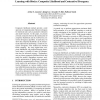Free Online Productivity Tools
i2Speak
i2Symbol
i2OCR
iTex2Img
iWeb2Print
iWeb2Shot
i2Type
iPdf2Split
iPdf2Merge
i2Bopomofo
i2Arabic
i2Style
i2Image
i2PDF
iLatex2Rtf
Sci2ools
JMLR
2010
2010
Learning with Blocks: Composite Likelihood and Contrastive Divergence
Composite likelihood methods provide a wide spectrum of computationally efficient techniques for statistical tasks such as parameter estimation and model selection. In this paper, we present a formal connection between the optimization of composite likelihoods and the well-known contrastive divergence algorithm. In particular, we show that composite likelihoods can be stochastically optimized by performing a variant of contrastive divergence with random-scan blocked Gibbs sampling. By using higher-order composite likelihoods, our proposed learning framework makes it possible to trade off computation time for increased accuracy. Furthermore, one can choose composite likelihood blocks that match the model's dependence structure, making the optimization of higher-order composite likelihoods computationally efficient. We empirically analyze the performance of blocked contrastive divergence on various models, including visible Boltzmann machines, conditional random fields, and exponen...
Related Content
| Added | 19 May 2011 |
| Updated | 19 May 2011 |
| Type | Journal |
| Year | 2010 |
| Where | JMLR |
| Authors | Arthur Asuncion, Qiang Liu, Alexander T. Ihler, Padhraic Smyth |
Comments (0)

